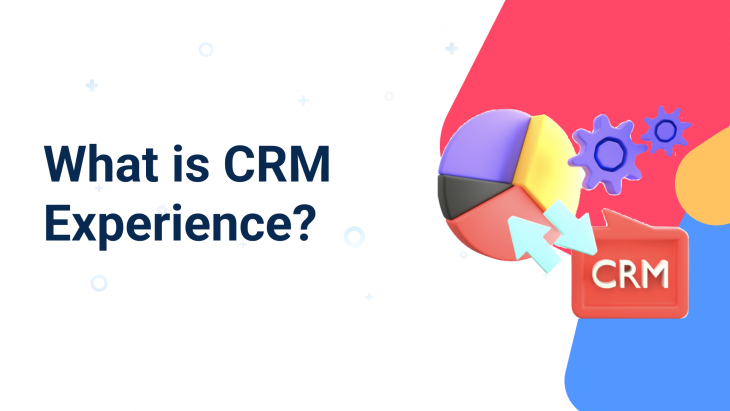Mastering Customer Relationship Management (CRM) isn’t just important—it’s essential. Why, you might wonder? Well, because CRM is the secret sauce for fostering happy customers, building loyalty, and ultimately, growing your business. But what exactly is CRM experience, and why should you care about it?
Join us in our latest blog post as we dive into the fascinating world of CRM experience. We’ll break down what it is, why it matters, and most importantly, how you can use it to take your business to the next level.
What is CRM experience?
CRM experience is like the story of your customers’ journey with your company. It’s all about the interactions and engagements they have, starting from the very first hello to the ongoing support they receive after making a purchase. This approach isn’t just about ticking boxes—it’s about nurturing relationships and making sure every step leaves your customers feeling satisfied and valued.
Unlike old-school CRM systems that only cared about the numbers, CRM experience is all about the bigger picture. It’s about treating each customer like a unique individual and tailoring every interaction to their needs. So forget one-size-fits-all approaches—CRM experience is all about creating meaningful connections that keep your customers coming back for more
What does it mean to have CRM experience?
Having CRM experience means understanding and effectively managing every aspect of customer interaction. It involves leveraging data insights to anticipate needs, deliver tailored solutions, and cultivate long-term relationships. Rather than viewing customers as mere transactions, businesses with CRM experience prioritize empathy, responsiveness, and proactive communication, striving to exceed expectations at every turn.
Why Does it Matter Today?
In today’s hyperconnected world, consumers expect more than just products or services—they crave seamless experiences and personalized attention. With countless options at their fingertips, customers are quick to switch brands if their expectations aren’t met. This is where CRM experience plays a pivotal role. By delivering exceptional experiences consistently, businesses can differentiate themselves, foster loyalty, and drive sustainable growth.
How to Perfect the CRM Experience
Perfecting the CRM experience requires a strategic approach and a customer-centric mindset. Here are some key strategies to consider:
- Data-driven Insights: Utilize CRM analytics to gain deep insights into customer behaviors, preferences, and pain points. This data-driven approach enables personalized interactions and targeted marketing campaigns.
- Integrated Platforms: Integrate CRM systems with other business tools, such as marketing automation and customer support software, to create a seamless experience across all touchpoints.
- Empowered Employees: Equip frontline staff with the tools and training they need to deliver exceptional service and resolve issues promptly. Empowered employees play a crucial role in building trust and rapport with customers.
- Continuous Improvement: Regularly solicit feedback from customers and internal stakeholders to identify areas for improvement. By continuously refining processes and offerings, businesses can adapt to evolving customer needs and preferences.
How can the CRM experience help your business?
Investing in CRM experience offers several benefits for businesses, including:
- Increased Customer Satisfaction: By prioritizing personalized interactions and timely support, businesses can enhance customer satisfaction and loyalty.
- Improved Retention Rates: Building strong relationships with customers increases their likelihood of repeat purchases and referrals, driving long-term revenue growth.
- Enhanced Insights: CRM data provides valuable insights into customer behaviors and trends, enabling informed decision-making and targeted marketing strategies.
- Competitive Advantage: Businesses that excel in CRM experience differentiate themselves in the market, gaining a competitive edge and positioning themselves as industry leaders.
How can you implement the CRM experience in your business?
Implementing CRM experience in your business requires a concerted effort across all departments. Here are some steps to get started:
- Define Customer Touchpoints: Map out the customer journey and identify key touchpoints where interactions occur.
- Invest in Technology: Choose a CRM platform that aligns with your business goals and integrates seamlessly with existing systems.
- Train Your Team: Provide comprehensive training to employees on CRM best practices, emphasizing the importance of customer-centricity and empathy.
- Prioritize Personalization: Tailor interactions and communications to meet individual customer needs and preferences, fostering a sense of connection and value.
Meet Nimble – Your Relationship Focused CRM
Meet Nimble – the ultimate CRM platform for cultivating genuine connections and personalized interactions. Nimble goes beyond tracking transactions by offering robust features such as intuitive contact management, seamless social media integration, and insightful analytics. With Nimble’s user-friendly interface, businesses can effortlessly streamline CRM processes while prioritizing customer satisfaction. Say hello to Nimble – where building lasting relationships is simple and rewarding.
Summary
In conclusion, CRM experience is more than just a buzzword—it’s a fundamental aspect of modern business strategy. By prioritizing customer relationships and delivering exceptional experiences, businesses can cultivate loyalty, drive growth, and stand out in today’s competitive landscape. With the right strategies and tools in place, mastering CRM experience is within reach for any organization committed to putting customers first.

